Search Results
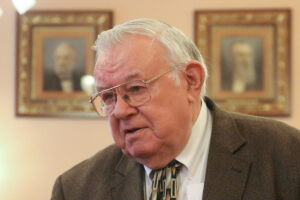
Interview of Ralph Skoog, July 17, 2015
Interviewed by Burdett Loomis
In his 2015 oral history interview, former Representative Ralph Skoog recalls a Kansas Legislature in transition. Ralph was initially elected to represent Topeka and Shawnee County in 1961, prior to the U.S. Supreme Court's Baker v. Carr 'one-person, one-vote' decision. His first 'district' was one-third of Shawnee County. When he returned to the House in 1967 after an unsuccessful campaign for Congress in 1964, he represented a more equal-size district of approximately 17, 000 residents of the County. Ralph recalls a legislature very much in transition at the beginning of the decline of rural domination of Show Morethe policymaking process and at the beginning of institutional change that came to fruition after the end of his last term. He recalls passage of important highway, prison, and school district consolidation legislation during his time of service in the House. Show Less
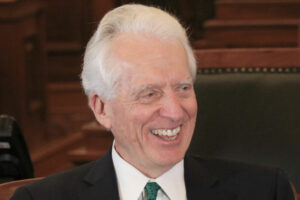
Interview of James (Jim) Slattery, March 6, 2020
Interviewed by Jim McLean
The 1970's marked major changes in state government. They are doing away with county welfare offices and creating the Department of Social and Rehabilitation Services (SRS) Concerns over lack of equalization started with Caldwell school finance case. Transportation is being centralized and modernized with the creation of the Department of Transportation (KDOT). Slattery even introduced legislation to decriminalize small amount of marijuana. Campaign finance reform (post-Watergate) and hiring non-partisan, professional staff for the legislature took hold. Slattery and another new freshman, Mike Hayden support legislation to clean up strip mines and reclaim mined Show Morelands. The first income tax reform was initiated despite the governor's veto. Community corrections is emerging as a good strategy. Slattery describes the role of abortion in civil discourse in this interview, how it started in the Dole/Roy race in 1974, and how it continues to distort the American political system in a significant way. He explains why he ran for Congress as a deficit hawk and talked about some of his Congressional experiences. The interview closes with a story about Tip O'Neil and another about former Speaker Clyde Hill who advised Slattery to be accurate when speaking at the Well of the House. Show Less
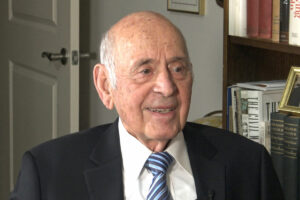
Interview of Bob Stephan, October 21, 2020
Interviewed by Michael (Mike) Matson
Former Attorney General Robert T. Stephan, in this 2020 oral history interview, recalls the highlights of his years serving the State of Kansas as Attorney General (1979 to 1995). Stephan's career as a champion of children as well as victims of crime and discrimination was shaped by his upbringing in Wichita and his strong sense of what it right. Stephan laments the increasingly partisan atmosphere of the National Association of Attorneys General, an organization to which he belonged during his time in state service.
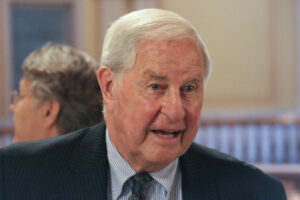
Interview of Robert (Bob) Storey, February 5, 2015
Interviewed by Burdett Loomis
Bob Storey in his 2015 oral history interview recalls his service in the Kansas Senate from 1969-1976. His recollection is of a senate that was in transition in terms of urban-rural influence on policymaking due to the one-person, one-vote principle enunciated by the U.S. Supreme Court in the mid-1960s. He recalls intricacies of interactions among senate leaders and governors and occasional intrigue in senate leadership elections. He also reflects on improvements in the functioning of state government during the years when reorganization and modernization of many state functions took place.

Interview of Joan Wagnon, May 11, 2018
Interviewed by H. Edward (Ed) Flentje
Ed Flentje's interview of former Representative Joan Wagnon is lengthy and complete, covering her 12 years in the state legislature, 4 years as Mayor of Topeka, and 8 years as Secretary of Revenue. She talks about the work of the House Taxation Committee in implementing legislation after passage of a constitutional amendment classifying property for tax purposes. Wagnon discusses the 1992 school finance lawsuit which produced massive change in the school funding formula, including how the concepts were developed and what strategies were used to get them passed. The interview covers in detail how the House Democrats interacted with Show MoreGovernor Finney in the 1991 session, when Finney vetoed the major tax bill and the Supreme Court found the school finance formula to be unconstitutional. Wagnon served as facilitator for the Children's Initiatives Committee which Speaker Marvin Barkis chaired. That committee produced fourteen bills that affected children and families. Economic development issues are discussed in the last part of the interview which links Wagnon's legislative interests to her work as Mayor of Topeka: neighborhood revitalization, spreading the tax base from city to county for Washburn University and the library, and developing economic development infrastructure to attract growth and new business for Topeka. She also discusses some of her eight years as Secretary of Revenue, particularly her involvement with the Streamlined Sales Tax.
A version of this interview is also posted on KansasMemory.org, the website of the Kansas Historical Society. Show Less

Interview of Ron Hein, April 16, 2021
Interviewed by Alan Conroy
Ron Hein, former legislator, lobbyist, and lawyer speaks about his 47 years in and around the Kansas Legislature and his impact on Kansas policy. He ran first for the House in 1974 in a 7-way primary which he won. Two years later he ran for the Senate, winning after extensive door-to-door campaigning against a well-known Senator, Bob Storey. He was just 25 when he was sworn into the Senate in 1975, Hein tells some interesting anecdotes about working with Speaker Pete McGill and Senate President Ross Doyen, particularly in his first years in the legislature. Hein Show Moresponsored or cosponsored 142 pieces of legislation on a wide variety of topics. His interview recounts the difficulty he had getting the Higher Education Loan program passed when he was in the House. Ultimately it failed the first year but passed the second. Hein noted the lack of lawyers in today's legislature is detrimental to the process, as is an increased lack of civility. The interview concludes with Hein discussing his lobbying career and why he felt he needed to leave elected office when T. Boone Pickens approached him to represent Mesa Petroleum. Hein notes that he has been more successful getting legislation passed as a lobbyist than as a legislator. Show Less
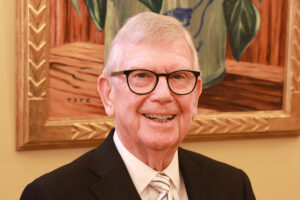
Interview of Gary Sherrer, October 15, 2021
Interviewed by Mike Matson
Gary Sherrer was a debater and it changed his life. His reflections on growing up in Topeka, winning a debate scholarship to Kansas State Teachers College and then teaching for eight years are the perfect backdrop to his later achievements. His association with the Graves Trucking Company and soon-to-be-Governor Bill Graves paved the way for him to become Bill Graves' Lt. Governor. Sherrer won the respect of many Kansas leaders, including Henry Bubb and Jordan Haines, two preeminent bankers who recruited him to the banking industry as chief marketing officer, and later, lobbyist when multi-bank holding company Show Morelegislation was pending. His debate skills served him well as a lobbyist, enabling the controversial bill to pass by one vote. He developed the Leadership Kansas model to train leaders. He knew how to solve community problems and displayed those skills as Secretary of Commerce for Governor Graves. One of his proudest accomplishments was the STAR bonds project in Wyandotte County, with Mayor Carol Marinovich. The interview is replete with examples of programs he developed or guided to fruition. It is interesting to read all the anecdotes about the political scene. Show Less

Interview of Barbara Sabol, January 14, 2022
Interviewed by Joan Wagnon
The former Secretary of Aging and Health and Environment under Governor John Carlin describes herself first and foremost as a nurse. That nursing background propelled her into high level positions in the local, state and federal government, always asking how her actions affected the children and the people she served. She started out in leadership positions in Kansas government and academia before being appointed Secretary of Aging by Governor John Carlin. She worked with advocates to establish the Silver-haired Legislature. She worked for Mayor Marion Barry in Washington DC in his office of Policy and Show MorePlanning in the Department of Human Services. Carlin asked her to return to Kansas as Secretary of Health and Environment where she quickly established a reputation as a problem solver for tough issues such as the permanent closure of a waste dump in Furley that leaked toxic chemicals. Sabol talks candidly about the challenges she faced as an African American and a woman and how she met those challenges. The interview concludes with her describing her latest project, housing for young adults who have aged out of the foster care system. Show Less
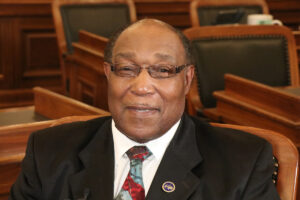
Interview of Ben Scott, January 14, 2022
Interviewed by Joan Wagnon
Ben Scott describes his life of service as an activist for schools and the community as well as his church. Scott's early experiences with segregation and racism informed his later activities as a member of the Board of Education in Topeka as the district sought to achieve racial balance in its public schools. The desegregation plans he and Sherman Parks Jr. developed in 1990's were instrumental in dismissing the federal lawsuit against the district. Scott was a leader in the Topeka and Kansas NAACP. He pointed out their priorities were finding enough Black teachers as Show Morewell as improving housing. Racial profiling was another NAACP concern that he carried to the Kansas legislature along with his concerns about student achievement and teachers having enough resources. In his interview, Rep. Scott talks candidly about racism in the juvenile justice system, racial profiling, Critical Race Theory (CRT), and the role of the church in dealing with racism. His hopes for continued legislative service were derailed by loss of election in 2016; however, he still pushes for developing standards for teaching Black history. Show Less

Interview of Eugene Anderson, April 21, 2022
Interviewed by Frances Jackson
Senator Anderson's interview covers his 20 year career in Kansas politics, serving in both House and Senate and later, in the administration of Governor Joan Finney and as a Wichita business man and author. Anderson describes growing up in Georgia and the values he learned in his segregated community - work hard, never quit, build relationships and make your community better. His issue when he went to the legislature was making the schools better. Anderson describes his friendship with Governor Joan Finney, going back to when she was State Treasurer and how he asked her not to Show Moreinvest in the apartheid government in South Africa. Later, she appointed him Director of Aviation and he was able to work with other state directors to support the Kansas aviation industry on product liability legislation. Throughout the interview Anderson reveals his philosophy of effective governance. Show Less
